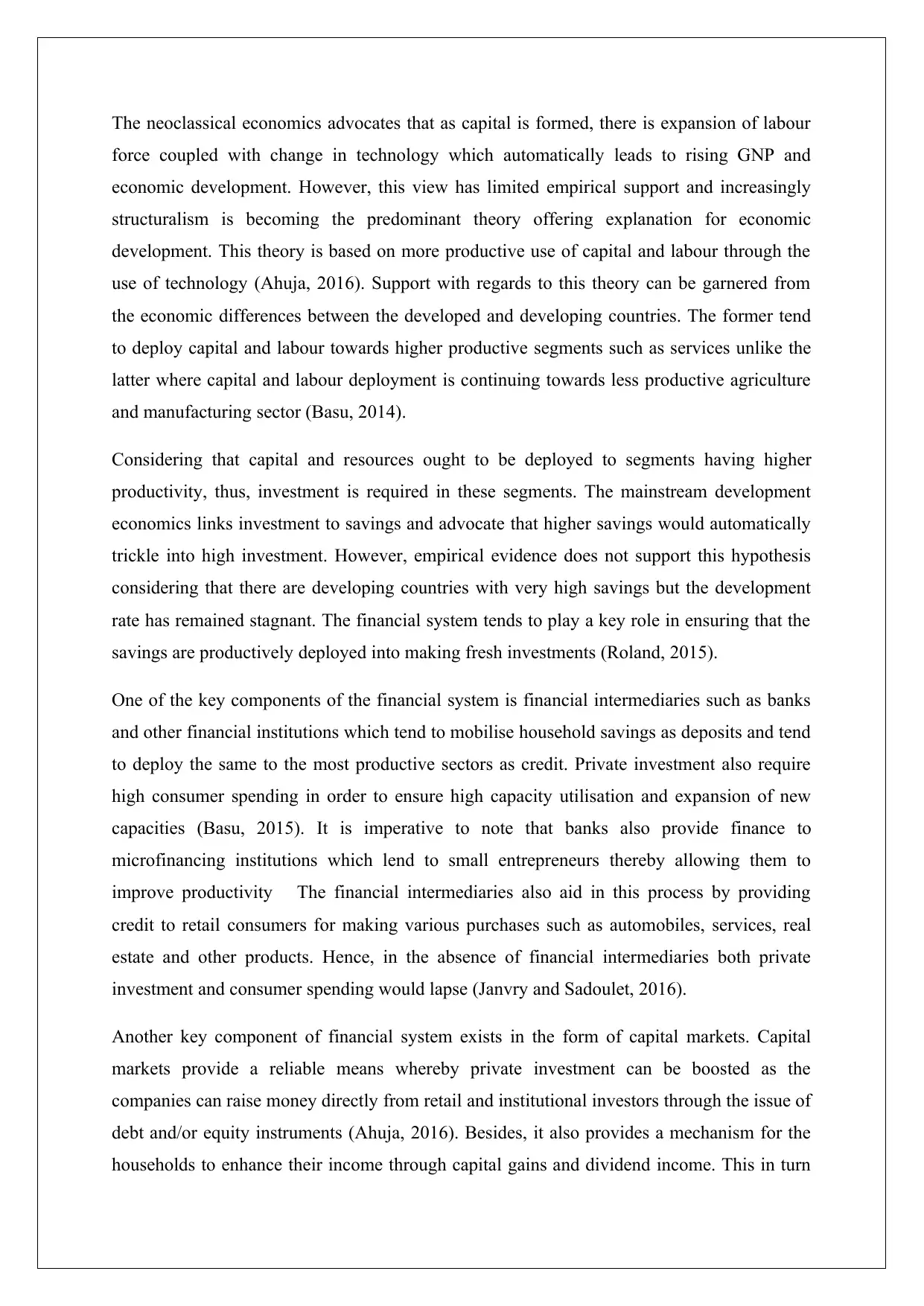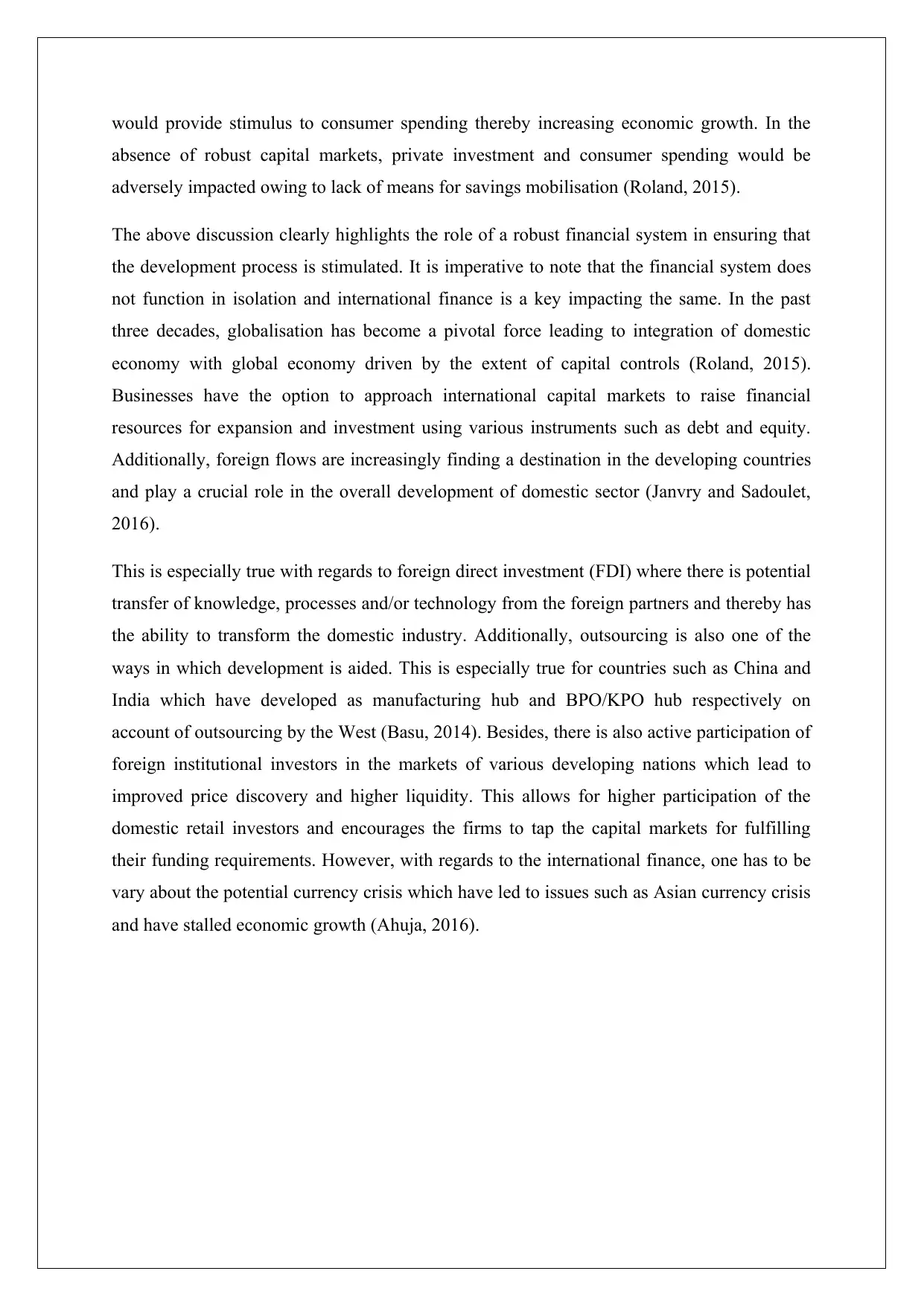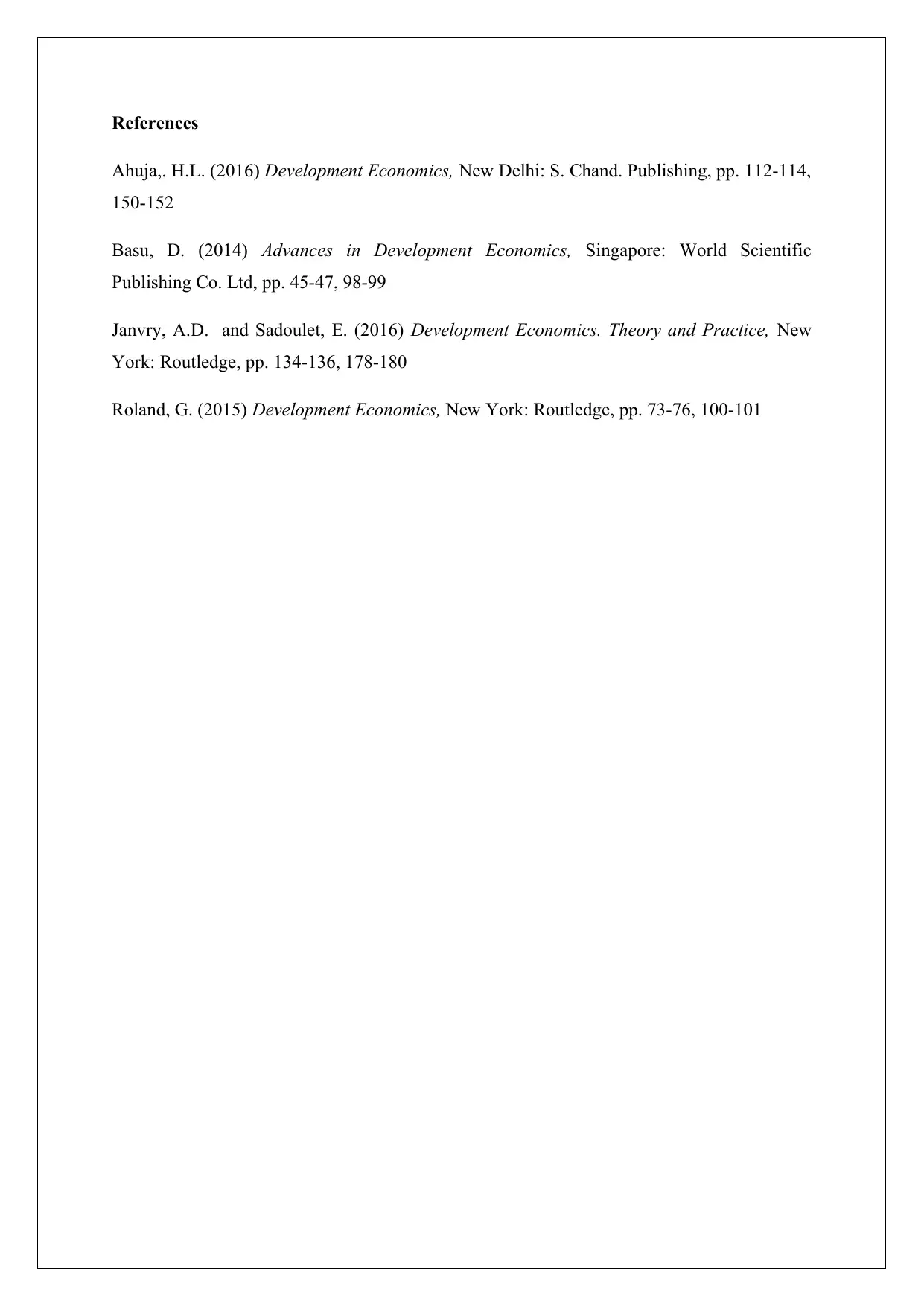Analyzing the Role of Financial System in Economic Development
VerifiedAdded on 2023/04/07
|4
|796
|489
Essay
AI Summary
This essay explores the role of the financial system in the development process, contrasting neoclassical economics with structuralism. It argues that a robust financial system, including financial intermediaries and capital markets, is crucial for mobilizing savings, promoting private investment, and stimulating consumer spending, all of which are essential for economic growth. The essay also examines the impact of international finance, highlighting both the benefits of globalization, such as access to foreign capital and technology transfer through FDI and outsourcing, and the risks, such as currency crises. It emphasizes the importance of a well-functioning financial system in fostering economic development while acknowledging the potential challenges posed by international financial integration.

ECONOMICS
STUDENT ID:
[Pick the date]
STUDENT ID:
[Pick the date]
Paraphrase This Document
Need a fresh take? Get an instant paraphrase of this document with our AI Paraphraser

The neoclassical economics advocates that as capital is formed, there is expansion of labour
force coupled with change in technology which automatically leads to rising GNP and
economic development. However, this view has limited empirical support and increasingly
structuralism is becoming the predominant theory offering explanation for economic
development. This theory is based on more productive use of capital and labour through the
use of technology (Ahuja, 2016). Support with regards to this theory can be garnered from
the economic differences between the developed and developing countries. The former tend
to deploy capital and labour towards higher productive segments such as services unlike the
latter where capital and labour deployment is continuing towards less productive agriculture
and manufacturing sector (Basu, 2014).
Considering that capital and resources ought to be deployed to segments having higher
productivity, thus, investment is required in these segments. The mainstream development
economics links investment to savings and advocate that higher savings would automatically
trickle into high investment. However, empirical evidence does not support this hypothesis
considering that there are developing countries with very high savings but the development
rate has remained stagnant. The financial system tends to play a key role in ensuring that the
savings are productively deployed into making fresh investments (Roland, 2015).
One of the key components of the financial system is financial intermediaries such as banks
and other financial institutions which tend to mobilise household savings as deposits and tend
to deploy the same to the most productive sectors as credit. Private investment also require
high consumer spending in order to ensure high capacity utilisation and expansion of new
capacities (Basu, 2015). It is imperative to note that banks also provide finance to
microfinancing institutions which lend to small entrepreneurs thereby allowing them to
improve productivity The financial intermediaries also aid in this process by providing
credit to retail consumers for making various purchases such as automobiles, services, real
estate and other products. Hence, in the absence of financial intermediaries both private
investment and consumer spending would lapse (Janvry and Sadoulet, 2016).
Another key component of financial system exists in the form of capital markets. Capital
markets provide a reliable means whereby private investment can be boosted as the
companies can raise money directly from retail and institutional investors through the issue of
debt and/or equity instruments (Ahuja, 2016). Besides, it also provides a mechanism for the
households to enhance their income through capital gains and dividend income. This in turn
force coupled with change in technology which automatically leads to rising GNP and
economic development. However, this view has limited empirical support and increasingly
structuralism is becoming the predominant theory offering explanation for economic
development. This theory is based on more productive use of capital and labour through the
use of technology (Ahuja, 2016). Support with regards to this theory can be garnered from
the economic differences between the developed and developing countries. The former tend
to deploy capital and labour towards higher productive segments such as services unlike the
latter where capital and labour deployment is continuing towards less productive agriculture
and manufacturing sector (Basu, 2014).
Considering that capital and resources ought to be deployed to segments having higher
productivity, thus, investment is required in these segments. The mainstream development
economics links investment to savings and advocate that higher savings would automatically
trickle into high investment. However, empirical evidence does not support this hypothesis
considering that there are developing countries with very high savings but the development
rate has remained stagnant. The financial system tends to play a key role in ensuring that the
savings are productively deployed into making fresh investments (Roland, 2015).
One of the key components of the financial system is financial intermediaries such as banks
and other financial institutions which tend to mobilise household savings as deposits and tend
to deploy the same to the most productive sectors as credit. Private investment also require
high consumer spending in order to ensure high capacity utilisation and expansion of new
capacities (Basu, 2015). It is imperative to note that banks also provide finance to
microfinancing institutions which lend to small entrepreneurs thereby allowing them to
improve productivity The financial intermediaries also aid in this process by providing
credit to retail consumers for making various purchases such as automobiles, services, real
estate and other products. Hence, in the absence of financial intermediaries both private
investment and consumer spending would lapse (Janvry and Sadoulet, 2016).
Another key component of financial system exists in the form of capital markets. Capital
markets provide a reliable means whereby private investment can be boosted as the
companies can raise money directly from retail and institutional investors through the issue of
debt and/or equity instruments (Ahuja, 2016). Besides, it also provides a mechanism for the
households to enhance their income through capital gains and dividend income. This in turn

would provide stimulus to consumer spending thereby increasing economic growth. In the
absence of robust capital markets, private investment and consumer spending would be
adversely impacted owing to lack of means for savings mobilisation (Roland, 2015).
The above discussion clearly highlights the role of a robust financial system in ensuring that
the development process is stimulated. It is imperative to note that the financial system does
not function in isolation and international finance is a key impacting the same. In the past
three decades, globalisation has become a pivotal force leading to integration of domestic
economy with global economy driven by the extent of capital controls (Roland, 2015).
Businesses have the option to approach international capital markets to raise financial
resources for expansion and investment using various instruments such as debt and equity.
Additionally, foreign flows are increasingly finding a destination in the developing countries
and play a crucial role in the overall development of domestic sector (Janvry and Sadoulet,
2016).
This is especially true with regards to foreign direct investment (FDI) where there is potential
transfer of knowledge, processes and/or technology from the foreign partners and thereby has
the ability to transform the domestic industry. Additionally, outsourcing is also one of the
ways in which development is aided. This is especially true for countries such as China and
India which have developed as manufacturing hub and BPO/KPO hub respectively on
account of outsourcing by the West (Basu, 2014). Besides, there is also active participation of
foreign institutional investors in the markets of various developing nations which lead to
improved price discovery and higher liquidity. This allows for higher participation of the
domestic retail investors and encourages the firms to tap the capital markets for fulfilling
their funding requirements. However, with regards to the international finance, one has to be
vary about the potential currency crisis which have led to issues such as Asian currency crisis
and have stalled economic growth (Ahuja, 2016).
absence of robust capital markets, private investment and consumer spending would be
adversely impacted owing to lack of means for savings mobilisation (Roland, 2015).
The above discussion clearly highlights the role of a robust financial system in ensuring that
the development process is stimulated. It is imperative to note that the financial system does
not function in isolation and international finance is a key impacting the same. In the past
three decades, globalisation has become a pivotal force leading to integration of domestic
economy with global economy driven by the extent of capital controls (Roland, 2015).
Businesses have the option to approach international capital markets to raise financial
resources for expansion and investment using various instruments such as debt and equity.
Additionally, foreign flows are increasingly finding a destination in the developing countries
and play a crucial role in the overall development of domestic sector (Janvry and Sadoulet,
2016).
This is especially true with regards to foreign direct investment (FDI) where there is potential
transfer of knowledge, processes and/or technology from the foreign partners and thereby has
the ability to transform the domestic industry. Additionally, outsourcing is also one of the
ways in which development is aided. This is especially true for countries such as China and
India which have developed as manufacturing hub and BPO/KPO hub respectively on
account of outsourcing by the West (Basu, 2014). Besides, there is also active participation of
foreign institutional investors in the markets of various developing nations which lead to
improved price discovery and higher liquidity. This allows for higher participation of the
domestic retail investors and encourages the firms to tap the capital markets for fulfilling
their funding requirements. However, with regards to the international finance, one has to be
vary about the potential currency crisis which have led to issues such as Asian currency crisis
and have stalled economic growth (Ahuja, 2016).
⊘ This is a preview!⊘
Do you want full access?
Subscribe today to unlock all pages.

Trusted by 1+ million students worldwide

References
Ahuja,. H.L. (2016) Development Economics, New Delhi: S. Chand. Publishing, pp. 112-114,
150-152
Basu, D. (2014) Advances in Development Economics, Singapore: World Scientific
Publishing Co. Ltd, pp. 45-47, 98-99
Janvry, A.D. and Sadoulet, E. (2016) Development Economics. Theory and Practice, New
York: Routledge, pp. 134-136, 178-180
Roland, G. (2015) Development Economics, New York: Routledge, pp. 73-76, 100-101
Ahuja,. H.L. (2016) Development Economics, New Delhi: S. Chand. Publishing, pp. 112-114,
150-152
Basu, D. (2014) Advances in Development Economics, Singapore: World Scientific
Publishing Co. Ltd, pp. 45-47, 98-99
Janvry, A.D. and Sadoulet, E. (2016) Development Economics. Theory and Practice, New
York: Routledge, pp. 134-136, 178-180
Roland, G. (2015) Development Economics, New York: Routledge, pp. 73-76, 100-101
1 out of 4
Your All-in-One AI-Powered Toolkit for Academic Success.
+13062052269
info@desklib.com
Available 24*7 on WhatsApp / Email
![[object Object]](/_next/static/media/star-bottom.7253800d.svg)
Unlock your academic potential
Copyright © 2020–2025 A2Z Services. All Rights Reserved. Developed and managed by ZUCOL.